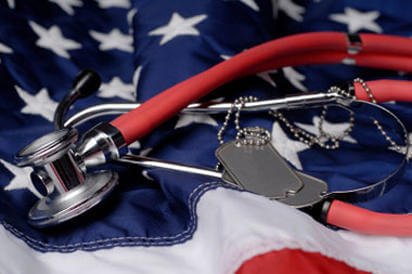Retirees eligible for TRICARE for Life (TFL) will face higher outpatient costs at VA hospitals and clinics starting Oct. 1 if they continue to seek care there for conditions not rated as service-connected.
TRICARE managers this spring discovered that, for more than a decade, TRICARE was exceeding its legal authority by covering almost all outpatient costs that VA assessed on elderly retirees who were treated for ailments or injuries not linked to time in service.
On Oct. 1 that will end.
TRICARE policy regarding TFL retirees and VA health care will "get back into sync" with statutory requirements, explained Michael O'Bar, deputy chief of TRICARE policy and operations, in a phone interview Tuesday.
Wisconsin Physicians Service, support contractor for the TRICARE for Life program, sent letters this month to 12,000 TFL retirees all of whom, over the past year or so, received VA care for conditions unrelated to service disabilities. Though they have paid very little out of pocket in the past, the letter warned, they soon could face higher costs for that VA-provided care.
The law that established TRICARE for Life as a prized supplement to Medicare for retirees 65 and older directs TRICARE to cover the cost of TFL claims only after Medicare has paid its share, followed by any other health insurance that retirees might have to serve as second payer.
VA does not actively recruit TRICARE beneficiaries to its clinics and hospitals, officials explained. But VA is a TRICARE network provider and will deliver care to TRICARE beneficiaries as capacity allows. This usually is for specialty services, but some VA facilities also have primary care capacity.
More often, when VA already is caring for a veteran with a service-connected condition, in order to care for the whole patient, VA has offered veterans the option of using their TRICARE benefit for routine care that falls outside their service-connected condition.
The hitch is that while VA facilities are TRICARE-authorized providers, they are not Medicare certified so VA cannot bill Medicare for that care given older military retirees for non-service connected ailments, officials recently realized. That means TRICARE can pay no more than 20 percent of TRICARE-allowable charges. The beneficiary legally is responsible for the 80 percent Medicare won't pay because VA is not a Medicare-certified provider.
TRICARE, in effect, has been violating the law by covering the whole tab for VA care to these TFL beneficiaries. O'Bar explained that TRICARE overpaid because it relied on a Memorandum of Understanding between VA and DoD on care reimbursements signed in 1995. The memo wasn't updated to reflect the TRICARE for Life law enacted in 2001.
A new memo is being drafted.
O'Bar said making the required change effective Oct. 1 gives retirees time to avoid higher VA costs by finding private sector care providers who will accept Medicare, and using TLF, as designed, to cover provider costs that Medicare won't pay.
Many veterans, including many TFL retirees, qualify for cost-free VA health care services due to compensable service-connected conditions or other qualifying factors. These veterans will see no change come October. Among veterans who will still get all VA health care and prescriptions at no charge are veterans with service-connected disabilities rated 50 percent or higher and former prisoners of war.
The 12,000 TFL retirees who received letters this month were identified from a review of TFL claims involving VA care of non-service connected ailments from April 2012 through May 2013. O'Bar acknowledged there could be more who use VA care infrequently. But the overall number still would be small compared to 2.1 million total TFL beneficiaries, he said.
TRICARE estimates that it improperly covered only about $1 million of VA costs per year, or an average of $83 per retiree. So if added VA costs are imposed, TFL beneficiaries are more likely to be irritated than financially distressed. Those who use private sector providers in combination with their TFL benefit usually avoid any out-of-pocket health costs, beyond Medicare Part B premiums that all TFL users must pay.
O'Bar said TFL otherwise has been operating as Congress intended.
"VA is the one place where we have been out of sync with the [legal] requirement and we are working hard to get back in," O'Bar said. "As we do that we're trying to make sure we communicate with our beneficiaries on what's going on and giving them plenty of lead time…to work with our TRICARE for Life contractor, Wisconsin Physicians Service, in locating an alternative source of care."
By using Medicare authorized providers in the private sector and TRICARE for Life as "wraparound" coverage to Medicare, these TFL beneficiaries, O'Bar said, "will not pay anything for their care."
VA officials said they are prepared to explain the cost change to TFL beneficiaries who show up for care on or after Oct. 1. Indeed, TFL retirees will be asked to sign a form that explains how they could face higher costs if they elect to use TRICARE benefits for certain VA care, and they don't have other health insurance or don't qualify, through disability, for full VA benefits.
More information is available by calling the TFL contractor at 866-773-0404 or by visiting online www.TRICARE.mil/tfl. Information on TRICARE-authorized and Medicare-certified care providers can be found at: www.TRICARE.mil/findaprovider.
To comment, write Military Update, P.O. Box 231111, Centreville, VA, or email milupdate@aol.com or twitter: Tom Philpott @Military_Update










